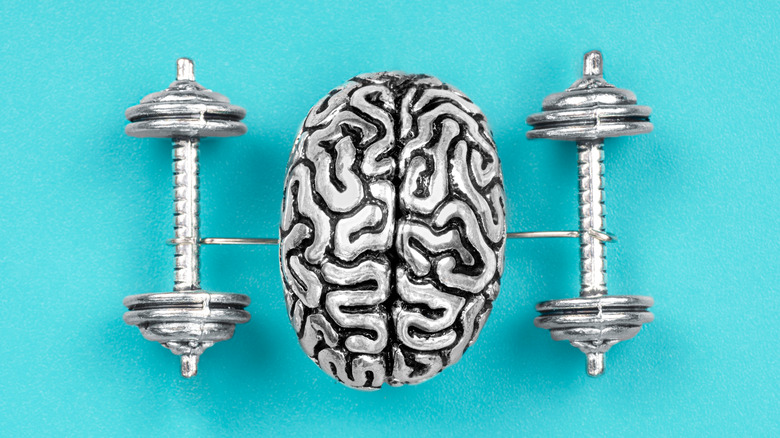Could Subliminal Messaging Be An Effective Way To Lose Weight?
With weight loss being as hard as it is, it'd be great to find an edge to make it even a little bit easier. Is there a method that doesn't involve eating or exercise to boost your weight loss capabilities subconsciously?
Despite the many supplements, diets, and workout plans out there, losing weight comes down to a straightforward formula. According to Mayo Clinic, weight loss is achieved by burning off more calories than you take in. Knowing exactly how weight loss works, though, doesn't make it any easier, and it still requires physical effort to burn calories and willpower not to eat more food. Meanwhile, it seems that food intake can be triggered by emotions, stress, and advertising, even when you're not necessarily in need of food (via Healthline). So can messaging, in turn, prevent you from eating more?
Subliminal messaging is defined as "A message passed to the human mind without the mind being consciously aware of it," per Collins Dictionary. The idea is that you can be given a message or idea that influences you without actually having to do anything but accidentally perceive it. In theory, this would be incredibly helpful in weight loss, among other things. According to Scientific American, the concept has rightly been debated and tested since the fifth century B.C. The results over time have been mixed, but how do they apply to weight loss?
Subliminal messaging can influence you
Studies in 2006 and 2007 found that subliminal messaging can influence you if you are already inclined to do something (via Scientific American). For example, those who were already thirsty were flashed images of Lipton Ice Tea and afterward were more inclined to choose that beverage. Another study showed that students who were shown words related to intelligence before a practice exam did better on the actual exam than those shown random words.
Unfortunately, when it comes to weight loss, the research findings are similar. In a 1992 study published in Applied Psychology, weight loss was compared in three groups of overweight women. Despite only one of the groups receiving subliminal messaging to encourage weight loss, all three groups lost the same amount of weight. Another study in 2018 found that subliminal messaging given to those with strong weight loss goals had moderate success when given without any negative messaging. The same messaging, though, had little to no effect on those with weak weight loss goals.
Another 2014 study reinforces the effectiveness of positive messaging, as exercisers shown positive visuals participated in cycling for longer than those shown negative visuals. So it seems that, yes, the brain can be influenced to a degree when the drive to achieve a goal already exists, as long as the messaging is positive. While many subliminal messaging weight-loss programs exist and use various methods, it seems that positive visual messaging, in general, has the best chance of success.


